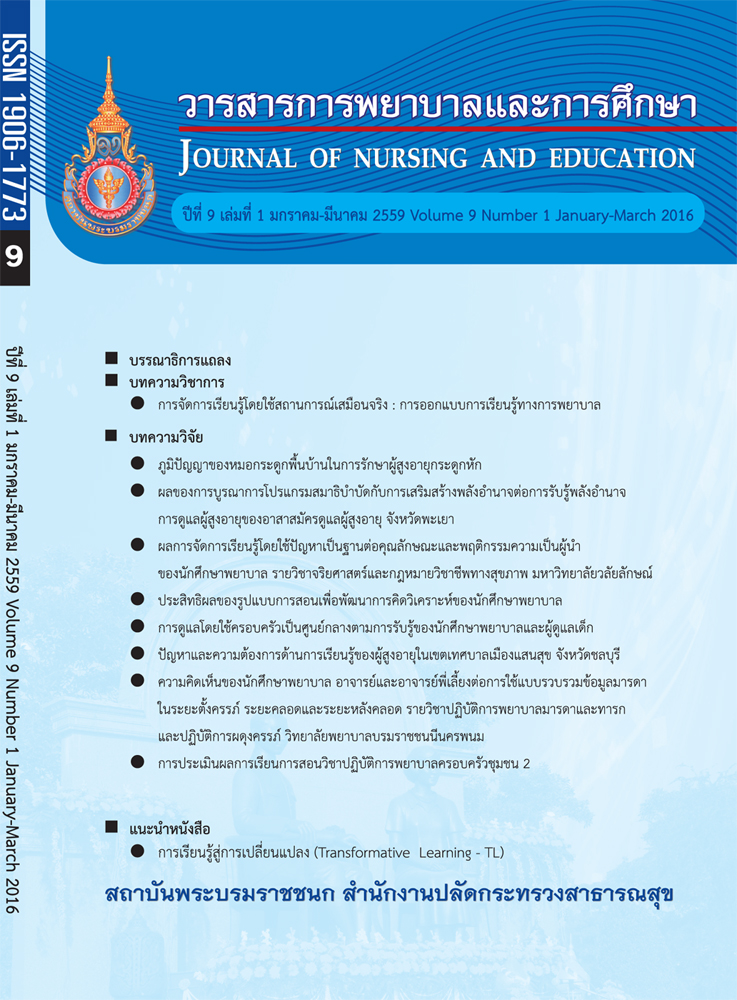ผลการจัดการเรียนการสอนโดยใช้ปัญหาเป็นฐานต่อความเป็นผู้นำของนักศึกษาพยาบาล
คำสำคัญ:
Problem-based Learning, Leadership characteristics, Leadership behaviorsบทคัดย่อ
บทคัดย่อการวิจัยครั้งนี้มีวัตถุประสงค์เพื่อเปรียบเทียบคุณลักษณะและพฤติกรรมความเป็นผู้นำของนักศึกษาพยาบาลศาสตร์ มหาวิทยาลัยวลัยลักษณ์ก่อนและหลังทำการเรียนการสอนโดยใช้ปัญหาเป็นฐาน กลุ่มตัวอย่างเป็นนักศึกษาพยาบาลศาสตร์ชั้นปีที่ 3 ปีการศึกษา 2/2557 จำนวน 67 คน เครื่องมือที่ใช้ในการวิจัยเป็นแบบสอบถามคุณลักษณะและพฤติกรรมความเป็นผู้นำ มีค่าความเที่ยงเท่ากับ .91 เก็บรวบรวมข้อมูลโดยให้นักศึกษาตอบแบบสอบถามด้วยตนเองก่อนและหลังการเรียนรู้โดยใช้ปัญหาเป็นฐาน วิเคราะห์ข้อมูลโดยใช้สถิติค่าเฉลี่ย ค่าเบี่ยงเบนมาตรฐาน และ Paired sample t-test
ผลการวิจัยพบว่า
1) คะแนนเฉลี่ยคุณลักษณะความเป็นผู้นำอยู่ในระดับสูงทั้งด้านบุคลิกภาพ ด้านความสามารถเชิงทักษะและด้านสติปัญญาตามลำดับ ( = 4.20, SD =.41; = 4.19, SD = .48; = 4.00; SD = .61) และพฤติกรรมความเป็นผู้นำอยู่ในระดับสูงทั้งแบบเน้นการมีส่วนร่วม แบบเน้นความสัมพันธ์และแบบนักพัฒนาตามลำดับ (= 4.32, SD = .49; = 4.29; SD = .51; = 4.12, SD = .55) หลังทำการเรียนการสอนโดยใช้ปัญหาเป็นฐานคะแนนเฉลี่ยเพิ่มขึ้น ทั้งคุณลักษณะความเป็นผู้นำและพฤติกรรมความเป็นผู้นำ คะแนนเฉลี่ยด้านความสามารถเชิงทักษะ ด้านบุคลิกภาพและด้านสติปัญญาตามลำดับ (= 4.32, SD =.50; = 4.25, SD = .46; = 4.12; SD = .49) และพฤติกรรมความเป็นผู้นำแบบเน้นความสัมพันธ์ แบบเน้นการมีส่วนร่วมและแบบนักพัฒนาตามลำดับ (= 4.47, SD= .44; = 4.43; SD = .45; = 4.27, SD = .56)
2) ผลการเปรียบเทียบก่อนและหลังการเรียนการสอนโดยใช้ปัญหาเป็นฐานพบว่า นักศึกษามีคุณลักษณะความเป็นผู้นำที่ไม่แตกต่างกัน ในขณะที่พฤติกรรมความเป็นผู้นำโดยรวมของนักศึกษาหลังเรียนสูงกว่าก่อนเรียนโดยใช้ปัญหาเป็นฐานอย่างมีนัยสำคัญทางสถิติ (t = 2.66, p < .01)
จะเห็นได้ว่าการจัดการเรียนการสอนโดยใช้ปัญหาเป็นฐานสามารถพัฒนาพฤติกรรมความเป็นผู้นำของนักศึกษาพยาบาลได้เป็นอย่างดี ดังนั้น ควรนำรูปแบบการจัดการเรียนการสอนโดยใช้ปัญหาเป็นฐานมาใช้อย่างต่อเนื่องและเพิ่มมากขึ้น เพื่อเป็นการส่งเสริมพฤติกรรมความเป็นผู้นำของนักศึกษาให้สูงยิ่งขึ้น
คำสำคัญ : การเรียนการสอนโดยใช้ปัญหาเป็นฐาน คุณลักษณะความเป็นผู้นำ พฤติกรรมความเป็นผู้นำ
Outcomes of Using Problem-based Learning Approach
for Leadership of Nursing Students
Abstract
The purposes of thisresearch were to study and compare leadership characteristics and behaviors of nursing students, on approaching pre and post problem- based learning. Research samples consisted of 67 third-year nursing students in term 2/2557 of the Institute of Nursing, Walailak University. A questionnaire instrument was used to investigate and a test. Reliability of the instruments was at 0.91. Data were collected by the nursing students who answered the questionnaires on pre-post problem-based learning. The data were analyzed by mean, standard derivation, and paired sample t-test.
The results revealed that:
1) The mean score of the leadership characteristics of nursing students before using problem-based learning was high personality, ability and intelligence respectively (= 4.20, SD = .41; = 4.19, SD = .48; = 4.00; SD = .61). The leadership behaviors were high participation style, interpersonal style, and developer style respectively (= 4.32, SD = .49; = 4.29; SD = .51, = 4.12, SD = .55). After using problem-based learning approached, all of leadership characteristics and behaviors were increase, such as high ability, personality, and intelligence respectively ( = 4.32, SD =.50; = 4.25, SD = .46; = 4.12; SD = .49) and high interpersonal style, participative style, and developer style respectively ( = 4.47, SD= .44; = 4.43; SD = .45, = 4.27, SD = .56).
2) Compared the mean score with pre and post problem- based learning approach indicated that the leadership characteristics was not statistically significant, but the leadership behaviors was significantly higher than before (t = 2.66, p < .01).
In conclusion, the finding may indicate the advantages of problem-based learning can promote nursing students to learn and develop their leadership behaviors. Therefore instructors should encourage and apply the problem-based learning in nursing curriculum. Furthermore the leadership behaviors of the nursing students are increase.
Keywords : Problem-based Learning; Leadership characteristics; Leadership behaviors






